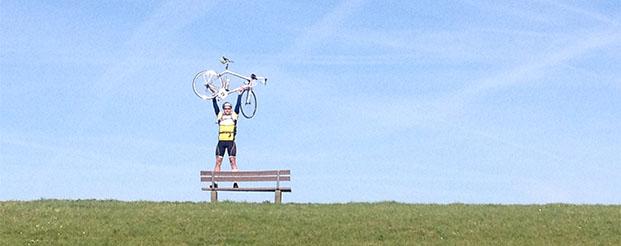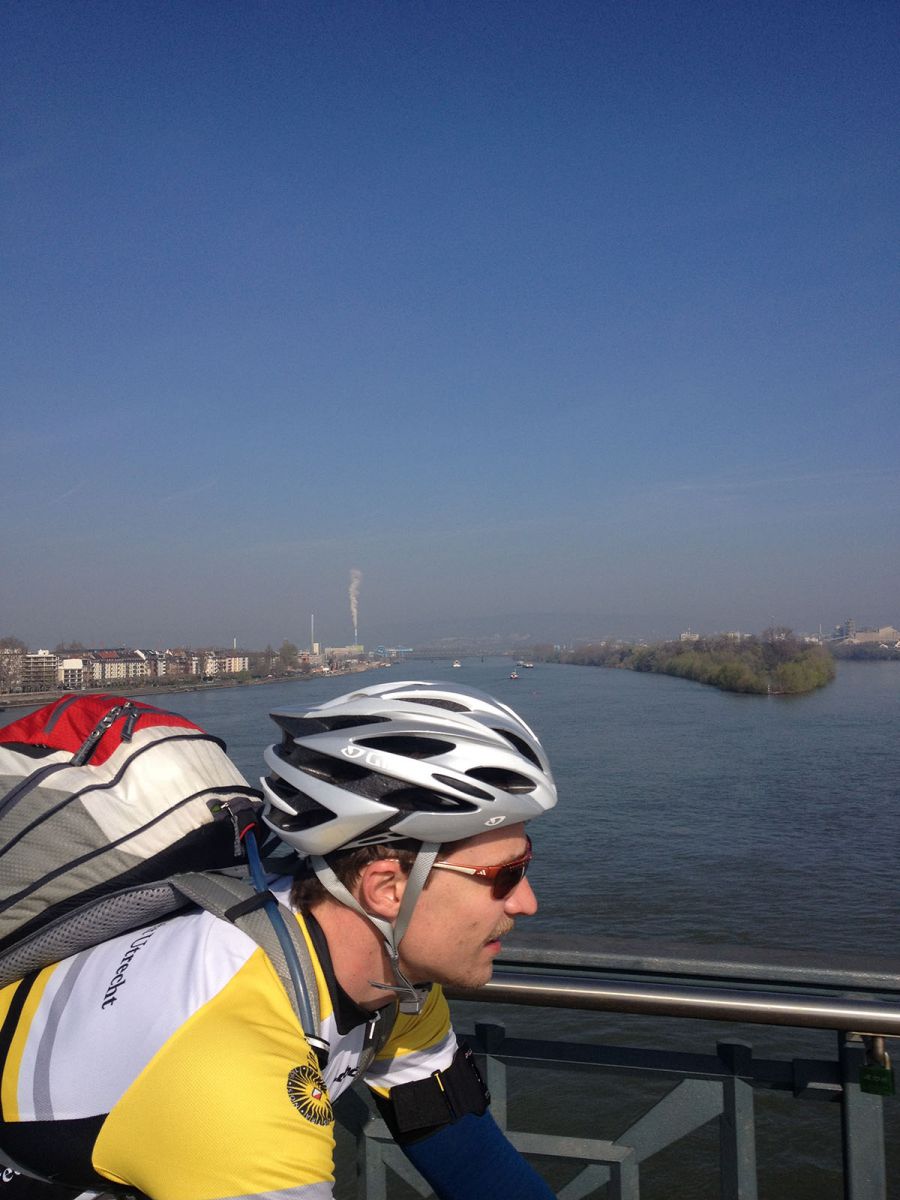Cycling all the way to Utrecht

Michael Klenk is PhD student in Philosophy and biked from his hometown in Southern Germany to Utrecht. In a UU-bike jersey. He wrote down his contemplations during the tour.
I am a PhD student in philosophy at Utrecht University and this is the story of my 750km bicycle commute from my hometown in Southern Germany to Utrecht. The idea was simple enough and inspired by the Dutch way of life: if you want to get from A to B, you take the bike. The route I took connects two important places of my life: Oberstenfeld, nearby Stuttgart, the place where I grew up, and Utrecht, the place at which I will work and live for the next four years.
The journey was meant as a metaphor, too. Having the opportunity to pursue a PhD means a lot to me. And it took me some effort to get where I am. Thus I felt that a somewhat challenging journey would be a memorable symbol for striving for a goal and for appreciating the route towards it. Finally, the route along the Rhine promised to be interesting for it connects Germany and The Netherlands and provided the stage to many historic events and figures.
We started on April 08. The tour took six days to complete and lead from Oberstenfeld to Karlsruhe and from there all the way downstream of the river Rhine to Utrecht. I tackled the tour together with a friend. We spent about 5-8h on our bikes every day, completing between 80 and 170km on every stage. Meters in altitude were a maximum of ca 1000m a day and thus negligible. The biggest challenge, perhaps surprisingly, was thus not muscular fatigue but to remain seated all day. Something I would not have expected to be the problem of a philosopher, ever.
 The routing down the Rhine is intriguing and merits much more than the short amount of time that we had (I could not afford more, it was a commute after all!). On the way to Utrecht we passed the myth-enshrouded Speyer and Worms, further downstream the famous terroir of the Riesling wine, lively Mainz and Koblenz, charming Cologne, affluent and industrious Düsseldorf, industrial Duisburg, mythical Xanten, and the boarder to The Netherlands at Millingen an de Rijn, Arnhem, and finally Utrecht.
The routing down the Rhine is intriguing and merits much more than the short amount of time that we had (I could not afford more, it was a commute after all!). On the way to Utrecht we passed the myth-enshrouded Speyer and Worms, further downstream the famous terroir of the Riesling wine, lively Mainz and Koblenz, charming Cologne, affluent and industrious Düsseldorf, industrial Duisburg, mythical Xanten, and the boarder to The Netherlands at Millingen an de Rijn, Arnhem, and finally Utrecht.
The most memorable feature of our tour how such a wide spectrum of landscapes and people stands out as different, even along this comparatively short route, and yet blends together to one coherent impression. Around Karlsruhe, we found ourselves in a rather poor, bucolic area, in which people’s lifes were, and still are, shaped by the harvest seasons.
In the mid-section of the Rhine, impressive fortresses, high up on hills, signal where once somebody thought something to be worthwhile of protection. After two days on the bike, you may then reach an area that is evidently shaped by its industrial past. Neat farmhouses make place to stark, former apartment blocks for steel-workers and smoking chimneys. People change, too, in their dialects and habits. If locals understand you at all, you’ll earn strange looks for ordering beer at night around Nierstein, and just 120km upstream at Andernach, you’ll get the same disconcerting look for ordering wine.
Being on the bike for long hours every day makes these impressions all blur together under the monotone hum of the bike’s gear, as kilometres pass by.
Obviously, the atmosphere and the people in places such as Duisburg, Karlsruhe, Bonn or Remagen, where fierce fighting took place at the end of world-war two, is different. But the constant sight of the river quite vividly connects such different places and is a powerful reminder, that places and people, from Karlsruhe to Utrecht, have much in common, despite some minor differences.
We arrived in Utrecht on April 13. Surely the most exhausting yet mos rewarding commute of my life. For one, I know now how the route between Oberstenfeld and Utrecht looks like. To experience this first hand feels strikingly different than just seeing the landscape fly past aboard a train or plane. Moreover, the distance came into perspective, not just in terms of kilometres and hours. There is a lot of history on the track and, as I mentioned, a myriad of differences. In that sense, Oberstenfeld and Utrecht are far apart. Yet, of all I know, there is a firm and obvious connection nonetheless. This impression will stick with me and will make my time in Utrecht more memorable. After all, how you get somewhere makes quite a difference to how you feel about being there.
Utrecht University supported me with a bike jersey. It grabbed the attention to quite some people we met enroute and I hope that one impression will stick with them: what a great place Utrecht must be, if people take 750km long commutes to get there.